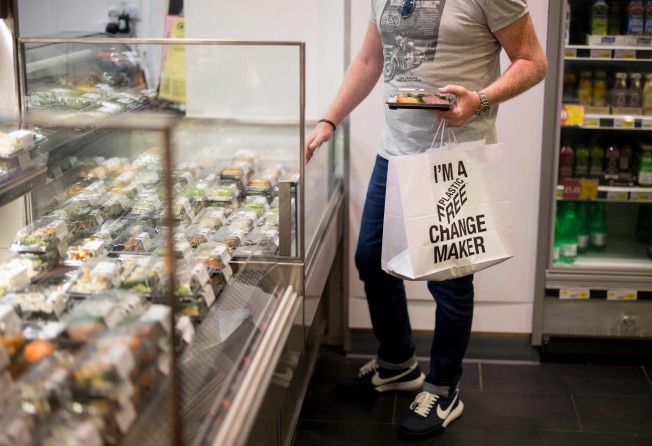
UK to ban single-use plastic cutlery, plates from October to reduce ‘devastating’ impact of plastic pollution
- Under the new rules, retailers and restaurants will not be able to sell single-use plastic plates, trays or some polystyrene cups and food containers
- Plastics are a growing environmental problem worldwide because they often do not decompose and can take centuries to break down

The UK said it will ban single-use plastic cutlery and plates in England from October as part of a drive to reduce plastic pollution and protect the marine environment.
Under the new rules, retailers and restaurants will not be able to sell single-use plastic plates, trays and balloon sticks or some types of polystyrene cups and food containers, Environment Secretary Thérèse Coffey said on Saturday in a statement. The Scottish and Welsh devolved governments have already taken similar action.
The move is part of a wider push to protect the environment by clamping down on waste that blights the countryside and oceans and by reducing greenhouse gas emissions from the production and disposal of plastics.

England uses 2.7 billion items of single-use cutlery per year as well as 721 million single-use plates, but only 10 per cent are recycled, according to Coffey’s Department for Environment, Food and Rural Affairs.
“We all know the absolutely devastating impacts that plastic can have on our environment and wildlife,” said Coffey. “These new single-use plastics bans will continue our vital work to protect the environment for future generations.”
Plastics are a growing environmental problem worldwide because they often do not decompose and can take centuries to break down. That has led to an accumulation of waste in the oceans and on beaches.
The Marine Conservation Society, a UK non-profit which runs an annual beach clean-up, said its volunteers retrieved an average 309 items of litter per 100 meters of beach in 2022, with 67 per cent of items made of plastic or polystyrene.
The government is also considering further measures on items like wet wipes, tobacco filters and sachets, the department said. The latest ban follows similar restrictions on microbeads, single-use plastic straws and cotton buds, while a charge on single-use plastic bags introduced in 2015 has driven down their use to a fraction of what it was.